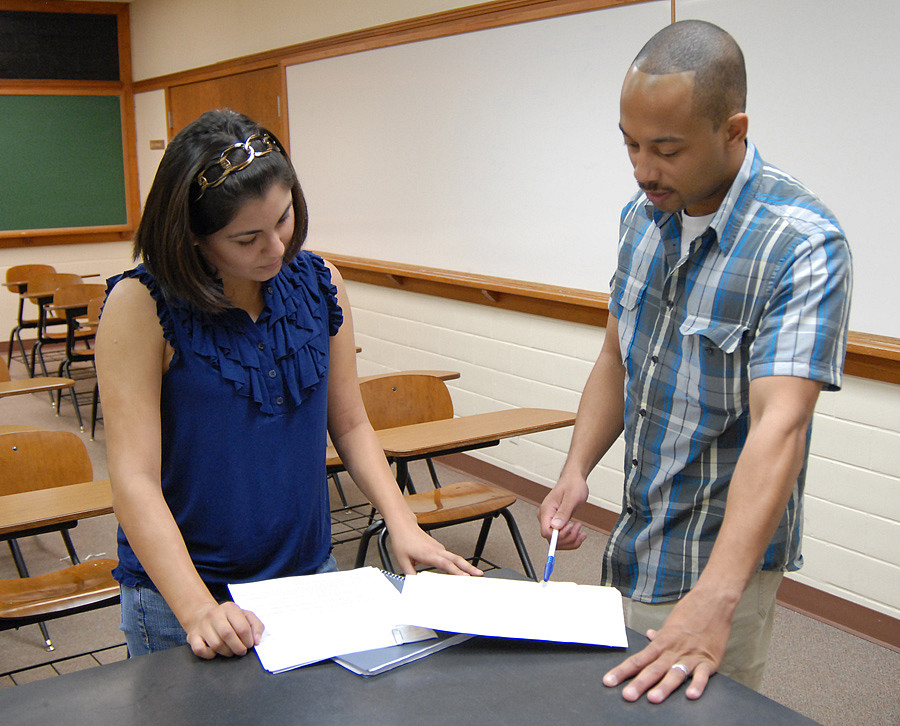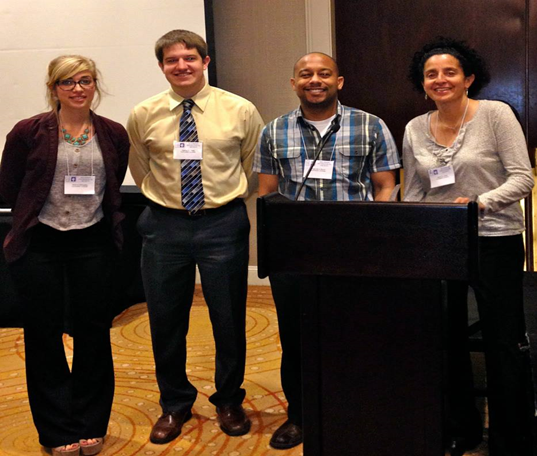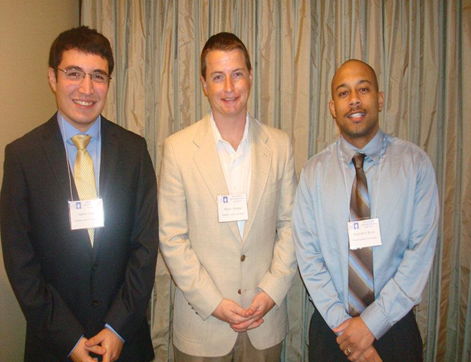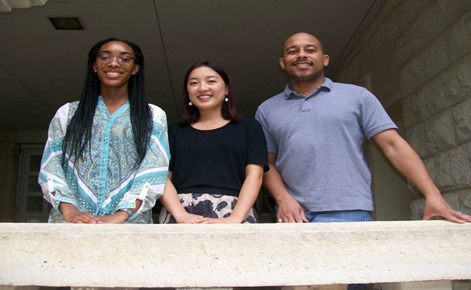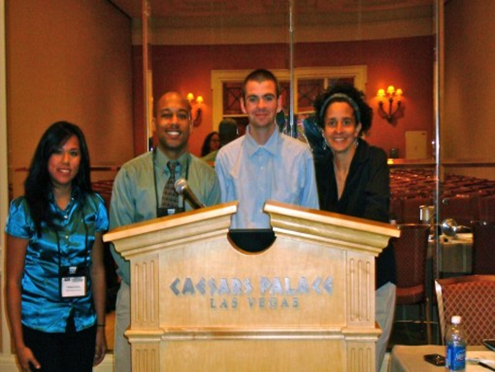News
Southwestern’s First Fully Tenured Black Faculty Member Reggie Byron Will Leave a Legacy of Change and Passion for Research
February 16, 2022
February 16, 2022
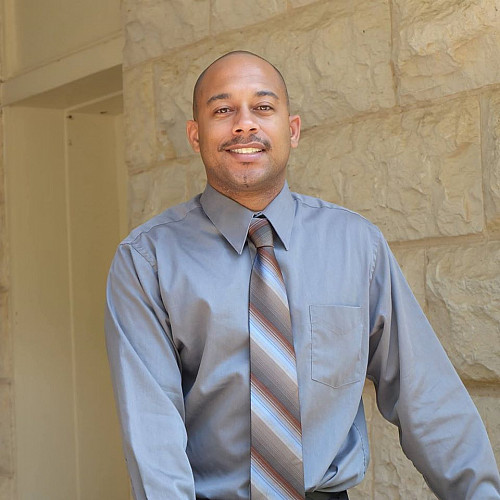
When Byron first came to Southwestern in 2009, he was one of three full-time Black faculty members (now there are five). After attending graduate school at SUNY Buffalo and The Ohio State University, he could have joined larger and more diverse faculties. But he says two things attracted him to Southwestern. One was his future colleagues. “When I was on the market long ago, I actually did what they call the American Sociological Association’s (ASA) Employment Fair, which is like speed dating, except for a job. And so, I did that and I met a couple of colleagues [Dr. Melissa Johnson and Dr. Ed Kain] from Southwestern.” He had never heard of Southwestern, but the SU team encouraged him to apply. “It wasn’t even on my radar, you know, but then I met them, and they were amazing.”
Byron was also attracted to the opportunity of working with undergraduates in a very direct way, being able to mentor students. “At larger universities, they sometimes push you toward the graduate students or to do your own research—and not necessarily focus on the undergraduate students,” he says.
Byron has, of course, taught many classes including methodology classes in the past 12 years and he has led 20-25 undergraduates in carrying out research projects.
“One of the ways to really show students how sociology is everywhere and show them the value of sociology is to get them to become producers of knowledge as opposed to only being consumers of knowledge,” he explains.
In order for students to make that transition in the classroom he has them read empirical articles. “To produce knowledge, you have to first understand how the knowledge is made. One of the ways I extend this outside of the classroom is to have students engage in either their own research projects where I shepherd them through the process or to engage in research with me,” he says.
To produce knowledge, you have to first understand how the knowledge is made. One of the ways I extend this outside of the classroom is to have students engage in either their own research projects where I shepherd them through the process or to engage in research with me.
The power of undergraduate research—to which Southwestern as an institution is dedicated—plays out in different ways. For some it means being co-author on a paper in a peer-reviewed journal; for others it means winning a prestigious award. For some it means being able to contribute to changes in campus life. And for others, it changes their life.
Byron explains that research projects with undergraduates can be a long process because “Undergraduates don’t come with the same skill sets as graduate students,” he says. On one recently closed multi-year project, Byron worked with seven Southwestern students to collect, content code, and analyze 1,000 employment discrimination cases from eight civil rights agencies across the United States. “But they are so thankful for the experience. For many of them, it opens the door for them to have professional opportunities where they can engage in some kind of data analysis or it opens the door for them to go to graduate school.”
He actively encourages students to both present at conferences and participate in the publication process. A number of the research projects between Byron, Dr. Maria Lowe, and their students have resulted in published papers such as fairly recent study that examined sexist and racist jokes among undergraduate students, one that looked at how sexual minorities experience campus, and one published nearly a decade ago that looked at differing experiences of white students and students of color in key interaction spaces on campus including classrooms and the campus dining hall. Those three studies helped move the needle on discussions of inclusion campus wide.
Other students that Byron has worked with have won awards like one student who received an invitation to the ASA Honors Program for her paper “Skin Tone, Colorism, and Colorblind Racism in the Age of Trump,” based on a draft initiated in Byron’s Research Methods course.
Byron relays the story of another special student who had taken every class he taught—she began in his introductory class. “She was a great student and she was one of the students who presented at a conference. And what was interesting, prior to attending the conference, she didn’t know what she wanted to do when she graduated. And that conference was a tipping point when she realized ‘I want to be a sociologist.’ Seeing how people received her research led to her realization she wanted to get a Ph.D. in Sociology.”
Although the student got her Ph.D. at Vanderbilt, Byron was invited to be an external dissertation committee reviewer. “The beauty of it was that I was with her from the very beginning when she first started studying sociology, until she ended her curricular program. She’s a professional sociologist now.”
Maria Lowe, a colleague of Byron’s in the Sociology Department says, “I have had the opportunity to work with Reggie on a few research projects during his time at Southwestern. He is a very astute and productive scholar and a generous colleague and collaborator.”
Lowe has seen how those traits influence his work with undergraduates. “In three of our four projects, we worked with three sets of undergraduate students, so I was also able to see how Reggie mentors students during the research process,” she says. “He treated the students with the utmost respect, patiently guiding them through quantitative data analysis workshops in the computer lab, and communicating in words and actions that he had confidence in them and their research abilities.”
Byron has also spent a fair amount of time advising student groups on campus, including EBONY, which works to promote unity between Black students and the SU community as well spread awareness and appreciation of the African and African Diaspora through programming.
“During my tenure as the advisor, the students of EBONY have done phenomenal things. One student recently raised a record number of crowd sourced funds to support EBONY, its initiatives and programming. They have invited speakers to campus and have movie nights, different activities to engage the Southwestern community. They focus on equity and social justice, but anyone is invited to the table,” he says.
He does encourage all of his students to attend EBONY events and those of HALO, an affinity group that supports Hispanic students on campus, and Pirates for Pride, the student group that supports LGBTQ+ communities. “It doesn’t make much sense to have insular conversations,” says Byron. “Different kinds of people need to hear the message and can contribute to whatever the conversations are.”
Other work that Byron has undertaken has been focused on faculty diversity. Byron led the Sociology and Anthropology department at Southwestern for three years and that was his first opportunity to increase faculty diversity by hiring adjuncts. Additionally, as a co-director of a substantial external grant from the Mellon Foundation, he and Dr. Omar Rivera hired diverse PhD teaching fellows, as a way to get their foot in the door at Southwestern. The pair also ran yearly workshops that offered nearly 60 faculty and University of Texas PhD students additional training in inclusive pedagogies. Not only do more diverse faculty members and faculty with training in enhancing inclusion help support students from underrepresented backgrounds feel more at home on campus, but they benefit students from the majority too. “Because having someone who has a different life experience, or someone who embraces critical epistemologies and inclusive pedagogies, is important for all students in the classroom,” he explains.
Because having someone who has a different life experience, or someone who embraces critical epistemologies and inclusive pedagogies, is important for all students in the classroom.
“For students of color, it is important for them to see themselves reflected at the front of the classroom. I know that they have a real sense of pride in the fact that there is someone who looks like them, who is doing the work that has been traditionally devalued because it focuses on people who look like them,” says Byron.
Kamrin Taylor is an example of a student who benefited from having Byron as a professor. Their backgrounds are considerably different. Taylor came to Southwestern from New Braunfels, Texas. She taken several classes with Byron and participated in a faculty-student research project with him. She is grateful for the coding and analysis skills that she learned from him and that she will need as a sociologist. “But even more than that,” Taylor says, “he has opened up my eyes to the way individuals, groups, and institutions can use their own agency to affect change. Dr. Byron has highlighted issues worthy of advocacy, and it is partially because of him that I am so passionate about my future working in criminal justice.”
Viewing himself as a public sociologist, Byron does consulting work with for-profit and non-profit companies (for example, he serves as a Justice, Equity, Diversity, and Inclusion co-chair on the Pease Park Conservancy Board of Directors) and has created a pipeline for Southwestern students to engage with these companies. One of Byron’s final missions has been to work with staff, students, and faculty to put together SUnity Day (Southwestern’s first all-day cross campus event to build community) in February 2022. Byron is optimistic about his legacy that will remain when he leaves Southwestern at the end of the academic year to join the faculty at University of Denver, an R1 research university. There Byron will have the opportunity to be the founding director of the Critical Race and Ethnic Studies Program.
“I hope my legacy is that I’ve opened the door for other individuals to come behind me and make Southwestern all that it can be. When I first started you know, there were a lot of things that you had to contend with being one of three Black professors—there was a lot of invisible labor and a lot of politics. But we’ve tried to make campus more inclusive and welcoming. I stood on the shoulders of those who came before me. And the idea is that the door is a bit more open now for younger teacher-scholars to take Southwestern to really great places,” he says.
With a hopeful tone he says, “What makes Southwestern really strong as an institution is the people who work here and the students themselves. They’re just remarkable.”















